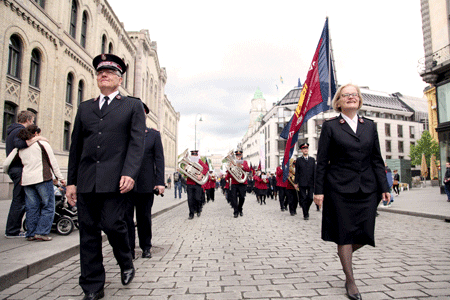Listen to this article
Listen to this article
Loading
Play
Pause
Options
0:00
-:--
1x
Playback Speed- 0.5
- 0.6
- 0.7
- 0.8
- 0.9
- 1
- 1.1
- 1.2
- 1.3
- 1.5
- 2
Audio Language
- English
- French
- German
- Italian
- Spanish
Open text
on the corner. by robert docter –. got compassion? we are not a large church but we are a very significant movement. i don’t know why we’re not a large church. i’m not sure we need a super-size to move toward our mission. we need committed people, filled with passion and willing to sacrifice some time and energy as extremist for the demonstration of christian love. maybe we’ve lost some of that passion so obvious in early day salvationists. maybe, like alice’s toads, some of us are out of breath and all of us are fat. i’m writing these words on the day the nation has chosen to celebrate the life of martin luther king, jr.; in recent days i’ve become deeply touched by the way king wove scripture into his speeches and made his speeches into sermons. passionate commitment, that’s a quality on which to build a movement. in his letter from the birmingham jail, king reminded us that our freedoms spiritually and politically–were purchased at the price of extreme passionate commitment by a few dedicated people leading rather small movements. booth was passionate concerning economic justice and equated its denial by society with sin. king did the same thing with racism. both movements are in the process of changing the world. like the army’s beginnings, king’s was started very simply by a very few people led with passionate conviction. an exhausted black woman, completely done in at the end of a tiring day’s work in montgomery, alabama got on a bus to go home. she sank gratefully into the first seat available at the front of the bus an area restricted to whites. ordered to move, she refused and was finally ejected from the bus. a small group from montgomery’s black community decided to boycott the buses and, after some considerable wrangling, decided to choose a compromise candidate as their leader. they thrust it on a new preacher in town–26-year-old martin luther king, jr. three days later he was arrested for going 30 miles an hour in a 25 mile per hour zone and spent the night in jail. philip yancey reprises the experience in his book soul survivor. shaken by the night in jail and numerous other threats, the following night, with his wife and child asleep, he anguished at his kitchen table filled with negative thoughts concerning the challenge ahead and his own adequacy. he saw his own fears and weaknesses and wondered how he could escape his new responsibility. in a sermon the following sunday he told his congregation how he “bowed down over a cup of coffee” and prayed out loud:. “lord. i’m down here trying to do what’s right. i think i’m right. i think the cause that we represent is right. but lord, i must confess that i’m weak now. i’m faltering. i’m losing my courage.”. king continued with his sermon:. “and it seemed at that moment i could hear an inner voice saying to me: martin luther–stand up for righteousness. stand up for justice. stand up for truth … and lo, i will be with you even to the end of the earth. i heard the voice of jesus saying still to fight on. he promised never to leave me, never to leave me alone. no never alone. no never alone. he promised never to leave me, never to leave me alone.”. nine years later at the conclusion of a march on washington to end segregation and racial discrimination a quarter of a million people assembled before the lincoln memorial and heard his keynote address. his eloquence stirred a nation. speaking extemporaneously, he challenged the nation to remember its creed and his listeners to remember its ethic. he said: “but there is something that i must say to my people who stand on the warm threshold that leads into the palace of justice. in the process of gaining our rightful place we must not be guilty of wrongful deeds. let us not seek to satisfy our thirst for freedom by drinking from the cup of bitterness and hatred. we must forever conduct our struggle on the high plane of dignity and discipline. we must not allow our creative protest to degenerate into physical violence. again and again we must rise to the majestic heights of meeting physical force with soul force.”. we have been talking in recent days about “incarnational ministry” about “authentic christianity” about economic justice — about reconciliation. we’ve been talking about living our lives like jesus about not just wondering what he would do in various challenging circumstances but being what he would be. and when we do, we become authentic christians reconciled with god reconciled with man. there’s nothing extreme about apathy. got passion?
Open context player
Close context player
Plays:-Audio plays count
on the corner. by robert docter –. got compassion? we are not a large church but we are a very significant movement. i don’t know why we’re not a large church. i’m not sure we need a super-size to move toward our mission. we need committed people, filled with passion and willing to sacrifice some time and energy as extremist for the demonstration of christian love. maybe we’ve lost some of that passion so obvious in early day salvationists. maybe, like alice’s toads, some of us are out of breath and all of us are fat. i’m writing these words on the day the nation has chosen to celebrate the life of martin luther king, jr.; in recent days i’ve become deeply touched by the way king wove scripture into his speeches and made his speeches into sermons. passionate commitment, that’s a quality on which to build a movement. in his letter from the birmingham jail, king reminded us that our freedoms spiritually and politically–were purchased at the price of extreme passionate commitment by a few dedicated people leading rather small movements. booth was passionate concerning economic justice and equated its denial by society with sin. king did the same thing with racism. both movements are in the process of changing the world. like the army’s beginnings, king’s was started very simply by a very few people led with passionate conviction. an exhausted black woman, completely done in at the end of a tiring day’s work in montgomery, alabama got on a bus to go home. she sank gratefully into the first seat available at the front of the bus an area restricted to whites. ordered to move, she refused and was finally ejected from the bus. a small group from montgomery’s black community decided to boycott the buses and, after some considerable wrangling, decided to choose a compromise candidate as their leader. they thrust it on a new preacher in town–26-year-old martin luther king, jr. three days later he was arrested for going 30 miles an hour in a 25 mile per hour zone and spent the night in jail. philip yancey reprises the experience in his book soul survivor. shaken by the night in jail and numerous other threats, the following night, with his wife and child asleep, he anguished at his kitchen table filled with negative thoughts concerning the challenge ahead and his own adequacy. he saw his own fears and weaknesses and wondered how he could escape his new responsibility. in a sermon the following sunday he told his congregation how he “bowed down over a cup of coffee” and prayed out loud:. “lord. i’m down here trying to do what’s right. i think i’m right. i think the cause that we represent is right. but lord, i must confess that i’m weak now. i’m faltering. i’m losing my courage.”. king continued with his sermon:. “and it seemed at that moment i could hear an inner voice saying to me: martin luther–stand up for righteousness. stand up for justice. stand up for truth … and lo, i will be with you even to the end of the earth. i heard the voice of jesus saying still to fight on. he promised never to leave me, never to leave me alone. no never alone. no never alone. he promised never to leave me, never to leave me alone.”. nine years later at the conclusion of a march on washington to end segregation and racial discrimination a quarter of a million people assembled before the lincoln memorial and heard his keynote address. his eloquence stirred a nation. speaking extemporaneously, he challenged the nation to remember its creed and his listeners to remember its ethic. he said: “but there is something that i must say to my people who stand on the warm threshold that leads into the palace of justice. in the process of gaining our rightful place we must not be guilty of wrongful deeds. let us not seek to satisfy our thirst for freedom by drinking from the cup of bitterness and hatred. we must forever conduct our struggle on the high plane of dignity and discipline. we must not allow our creative protest to degenerate into physical violence. again and again we must rise to the majestic heights of meeting physical force with soul force.”. we have been talking in recent days about “incarnational ministry” about “authentic christianity” about economic justice — about reconciliation. we’ve been talking about living our lives like jesus about not just wondering what he would do in various challenging circumstances but being what he would be. and when we do, we become authentic christians reconciled with god reconciled with man. there’s nothing extreme about apathy. got passion?
Listen to this article












